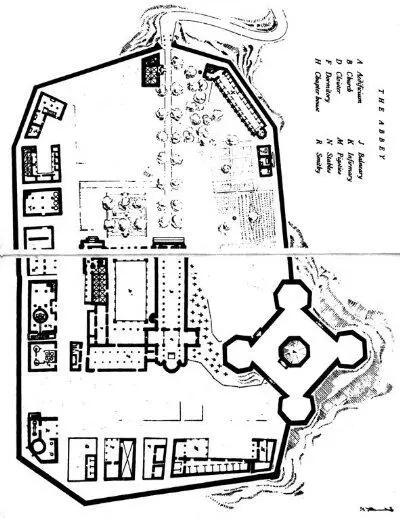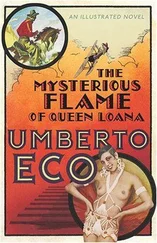Umberto Eco - The Name of the Rose
Здесь есть возможность читать онлайн «Umberto Eco - The Name of the Rose» весь текст электронной книги совершенно бесплатно (целиком полную версию без сокращений). В некоторых случаях можно слушать аудио, скачать через торрент в формате fb2 и присутствует краткое содержание. Год выпуска: 1983, ISBN: 1983, Издательство: Harcourt, Жанр: Исторический детектив, на английском языке. Описание произведения, (предисловие) а так же отзывы посетителей доступны на портале библиотеки ЛибКат.
- Название:The Name of the Rose
- Автор:
- Издательство:Harcourt
- Жанр:
- Год:1983
- ISBN:0-15-144647-4
- Рейтинг книги:4 / 5. Голосов: 1
-
Избранное:Добавить в избранное
- Отзывы:
-
Ваша оценка:
- 80
- 1
- 2
- 3
- 4
- 5
The Name of the Rose: краткое содержание, описание и аннотация
Предлагаем к чтению аннотацию, описание, краткое содержание или предисловие (зависит от того, что написал сам автор книги «The Name of the Rose»). Если вы не нашли необходимую информацию о книге — напишите в комментариях, мы постараемся отыскать её.
The Name of the Rose — читать онлайн бесплатно полную книгу (весь текст) целиком
Ниже представлен текст книги, разбитый по страницам. Система сохранения места последней прочитанной страницы, позволяет с удобством читать онлайн бесплатно книгу «The Name of the Rose», без необходимости каждый раз заново искать на чём Вы остановились. Поставьте закладку, и сможете в любой момент перейти на страницу, на которой закончили чтение.
Интервал:
Закладка:
On the other hand, there is no doubt that, in translating Adso’s Latin into his own neo-Gothic French, Vallet took some liberties, and not only stylistic liberties. For example, the characters speak sometimes of the properties of herbs, clearly referring to the book of secrets attributed to Albertus Magnus, which underwent countless revisions over the centuries. It is certain that Adso knew the work, but the fact remains that passages he quotes from it echo too literally both formulas of Paracelsus and obvious interpolations from an edition of Albertus unquestionably dating from the Tudor period. [1] Liber aggregationis seu liber secretorum Alberti Magni, Londinium, juxta pontem qui vulgariter dicitur Flete brigge, MCCCCLXXXV.
However, I discovered later that during the time when Vallet was transcribing (?) the manuscript of Adso, there was circulating in Paris an eighteenth century edition of the Grand and the Petit Albert , [2] Les Admirables Secrets d’Albert le Grand, A Lyon, Chez les Heritiers Beringos, Fratres, a l’Enseigne d’Agrippa, MDCCLXXV; Secrets merveilleux de la magie naturelle et cabalistique du Petit Albert , A Lyon, Chez les Heritiers Beringos, Fratres, a l’Enseigne d’Agrippa, MDCCXXIX.
now irreparably corrupt. In any case, how could I be sure that the text known to Adso or the monks whose discussions he recorded did not also contain, among glosses, scholia, and various appendices, annotations that would go on to enrich subsequent scholarship?
Finally, was I to retain in Latin the passages that Abbe Vallet himself did not feel it opportune to translate, perhaps to preserve the ambience of the period? There were no particular reasons to do so, except a perhaps misplaced sense of fidelity to my source… I have elimmated excesses, but I have retained a certain amount. And I fear that I have imitated those bad novelists who, introducing a French character, make him exclaim “Parbleu!” and “La femme, ah! la femme!”
In short, I am full of doubts. I really don’t know why I have decided to pluck up my courage and present, as if it were authentic, the manuscript of Adso of Melk. Let us say it is an act of love. Or, if you like, a way of ridding myself of numerous, persistent obsessions.
I transcribe my text with no concern for timeliness. In the years when I discovered the Abbe Vallet volume, there was a widespread conviction that one should write only out of a commitment to the present, in order to change the world. Now, after ten years or more, the man of letters (restored to his loftiest dignity) can happily write out of pure love of writing. And so I now feel free to tell, for sheer narrative pleasure, the story of Adso of Melk, and I am comforted and consoled in finding it immeasurably remote in time (now that the waking of reason has dispelled all the monsters that its sleep had generated), gloriously lacking in any relevance for our day, atemporally alien to our hopes and our certainties.
For it is a tale of books, not of everyday worries, and reading it can lead us to recite, with a Kempis, the great imitator: “In omnibus requiem quaesivi, et nusquam inveni nisi in angulo cum libro.”
January 5, 1980
NOTE
Adso’s manuscript is divided into seven days, and each day into periods corresponding to the liturgical hours. The subtitles, in the third person, were probably added by Vallet. But since they are helpful in orienting the reader, and since this usage is also not unknown to much of the vernacular literature of the period, I did not feel it necessary to eliminate them.
Adso’s references to the canonical hours caused me some puzzlement, because their meaning varied according to the place and the season; moreover, it is entirely probable that in the fourteenth century the instructions given by Saint Benedict in the Rule were not observed with absolute precision.
Nevertheless, as a guide to the reader, the following schedule is, I believe, credible. It is partly deduced from the text and partly based on a comparison of the original Rule with the description of monastic life given by Edouard Schneider in Les Heures benedictines (Paris, Grasset, 1925).
Matins (which Adso sometimes refers to by the older expression “Vigiliae”) Between 2:30 and 3:00 in the morning.
Lauds (which in the most ancient tradition were called “Matutini” or “Matins”) Between 5:00 and 6:00 in the morning, in order to end at dawn.
Prime Around 7:30, shortly before daybreak. Terce Around 9:00.
Sext Noon (in a monastery where the monks did not work in the fields, it was also the hour of the midday meal in winter).
Nones Between 2:00 and 3:00 in the afternoon.
Vespers Around 4:30, at sunset (the Rule prescribes eating supper before dark).
Compline Around 6:00 (before 7:00, the monks go to bed).
The calculation is based on the fact that in northern Italy at the end of November, the sun rises around 7:30 A.M. and sets around 4:40 P.M.

PROLOGUE
In the beginning was the Word and the Word was with God, and the Word was God. This was beginning with God and the duty of every faithful monk would be to repeat every day with chanting humility the one never-changing event whose incontrovertible truth can be asserted. But we see now through a glass darkly, and the truth, before it is revealed to all, face to face, we see in fragments (alas, how illegible) in the error of the world, so we must spell out its faithful signals even when they seem obscure to us and as if amalgamated with a will wholly bent on evil.
Having reached the end of my poor sinner’s life, my hair now white, I grow old as the world does, waiting to be lost in the bottomless pit of silent and deserted divinity, sharing in the light of angelic intelligences; confined now with my heavy, ailing body in this cell in the dear monastery of Melk, I prepare to leave on this parchment my testimony as to the wondrous and terrible events that I happened to observe in my youth, now repeating verbatim all I saw and heard, without venturing to seek a design, as if to leave to those who will come after (if the Antichrist has not come first) signs of signs, so that the prayer of deciphering may be exercised on them.
May the Lord grant me the grace to be the transparent witness of the happenings that took place in the abbey whose name it is only right and pious now to omit, toward the end of the year of our Lord 1327, when the Emperor Louis came down into Italy to restore the dignity of the Holy Roman Empire, in keeping with the designs of the Almighty and to the confusion of the wicked usurper, simoniac, and heresiarch who in Avignon brought shame on the holy name of the apostle (I refer to the sinful soul of Jacques of Cahors, whom the impious revered as John XXII).
Perhaps, to make more comprehensible the events in which I found myself involved, I should recall what was happening in those last years of the century, as I understood it then, living through it, and as I remember it now, complemented by other stories I heard afterward — if my memory still proves capable of connecting the threads of happenings so many and confused.
In the early years of that century Pope Clement V had moved the apostolic seat to Avignon, leaving Rome prey to the ambitions of the local overlords: and gradually the holy city of Christianity had been transformed into a circus, or into a brothel, riven by the struggles among its leaders; though called a republic, it was not one, and it was assailed by armed bands, subjected to violence and looting. Ecclesiastics, eluding secular jurisdiction, commanded groups of malefactors and robed, sword in hand, transgressing and organizing evil commerce. How was it possible to prevent the Caput Mundi from becoming again, and rightly, the goal of the man who wanted to assume the crown of the Holy Roman Empire and restore the dignity of that temporal dominion that had belonged to the Caesars?
Читать дальшеИнтервал:
Закладка:
Похожие книги на «The Name of the Rose»
Представляем Вашему вниманию похожие книги на «The Name of the Rose» списком для выбора. Мы отобрали схожую по названию и смыслу литературу в надежде предоставить читателям больше вариантов отыскать новые, интересные, ещё непрочитанные произведения.
Обсуждение, отзывы о книге «The Name of the Rose» и просто собственные мнения читателей. Оставьте ваши комментарии, напишите, что Вы думаете о произведении, его смысле или главных героях. Укажите что конкретно понравилось, а что нет, и почему Вы так считаете.










